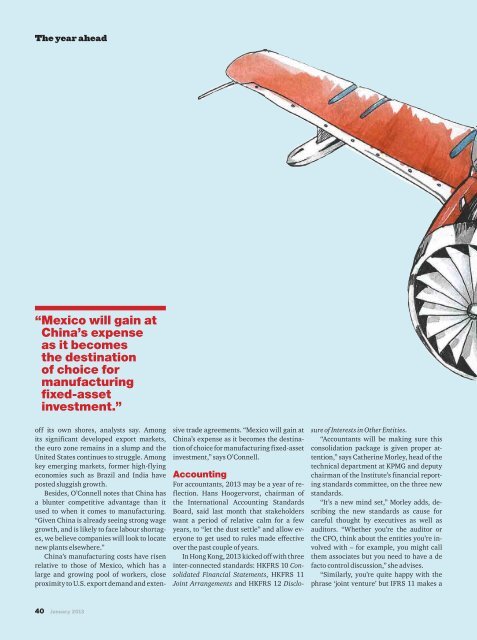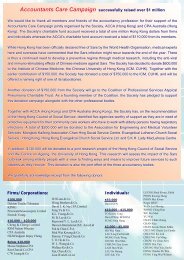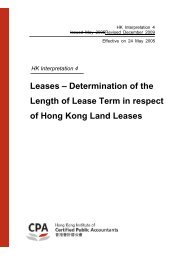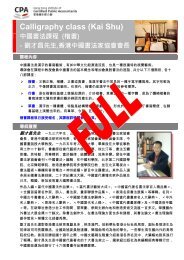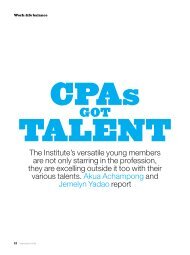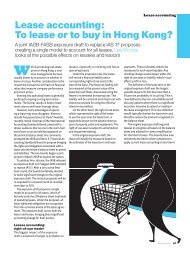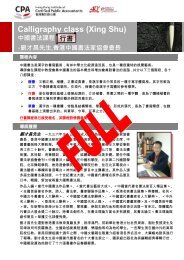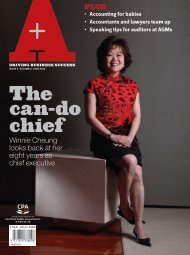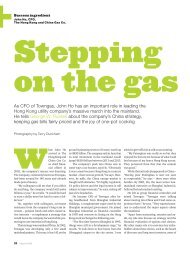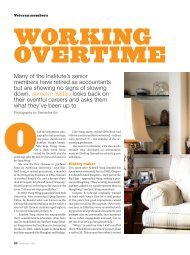The future of fashion - Hong Kong Institute of Certified Public ...
The future of fashion - Hong Kong Institute of Certified Public ...
The future of fashion - Hong Kong Institute of Certified Public ...
Create successful ePaper yourself
Turn your PDF publications into a flip-book with our unique Google optimized e-Paper software.
<strong>The</strong> year ahead<br />
“ Mexico will gain at<br />
China’s expense<br />
as it becomes<br />
the destination<br />
<strong>of</strong> choice for<br />
manufacturing<br />
fixed-asset<br />
investment.”<br />
<strong>of</strong>f its own shores, analysts say. Among<br />
its significant developed export markets,<br />
the euro zone remains in a slump and the<br />
United States continues to struggle. Among<br />
key emerging markets, former high-flying<br />
economies such as Brazil and India have<br />
posted sluggish growth.<br />
Besides, O’Connell notes that China has<br />
a blunter competitive advantage than it<br />
used to when it comes to manufacturing.<br />
“Given China is already seeing strong wage<br />
growth, and is likely to face labour shortages,<br />
we believe companies will look to locate<br />
new plants elsewhere.”<br />
China’s manufacturing costs have risen<br />
relative to those <strong>of</strong> Mexico, which has a<br />
large and growing pool <strong>of</strong> workers, close<br />
proximity to U.S. export demand and exten-<br />
40 January 2013<br />
sive trade agreements. “Mexico will gain at<br />
China’s expense as it becomes the destination<br />
<strong>of</strong> choice for manufacturing fixed-asset<br />
investment,” says O’Connell.<br />
Accounting<br />
For accountants, 2013 may be a year <strong>of</strong> reflection.<br />
Hans Hoogervorst, chairman <strong>of</strong><br />
the International Accounting Standards<br />
Board, said last month that stakeholders<br />
want a period <strong>of</strong> relative calm for a few<br />
years, to “let the dust settle” and allow everyone<br />
to get used to rules made effective<br />
over the past couple <strong>of</strong> years.<br />
In <strong>Hong</strong> <strong>Kong</strong>, 2013 kicked <strong>of</strong>f with three<br />
inter-connected standards: HKFRS 10 Consolidated<br />
Financial Statements, HKFRS 11<br />
Joint Arrangements and HKFRS 12 Disclo-<br />
sure <strong>of</strong> Interests in Other Entities.<br />
“Accountants will be making sure this<br />
consolidation package is given proper attention,”<br />
says Catherine Morley, head <strong>of</strong> the<br />
technical department at KPMG and deputy<br />
chairman <strong>of</strong> the <strong>Institute</strong>’s financial reporting<br />
standards committee, on the three new<br />
standards.<br />
“It’s a new mind set,” Morley adds, describing<br />
the new standards as cause for<br />
careful thought by executives as well as<br />
auditors. “Whether you’re the auditor or<br />
the CFO, think about the entities you’re involved<br />
with – for example, you might call<br />
them associates but you need to have a de<br />
facto control discussion,” she advises.<br />
“Similarly, you’re quite happy with the<br />
phrase ‘joint venture’ but IFRS 11 makes a


